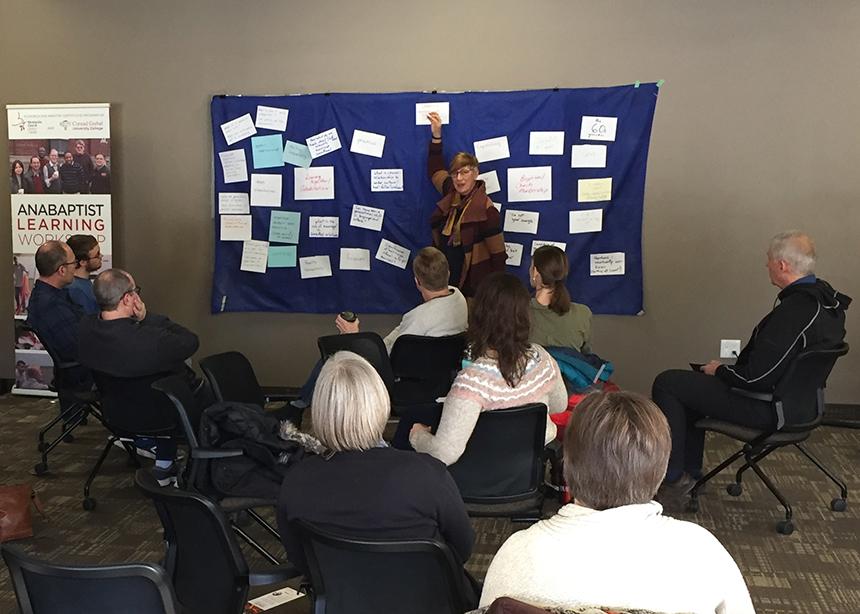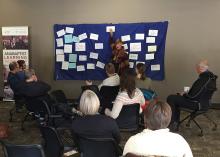Do Mennonite churches have commitment issues? Why are fewer people choosing rituals of commitment like baptism and marriage?
In an attempt to answer these questions, Irma Fast Dueck spent three days at Conrad Grebel University College last month. First, she delivered Grebel’s Bechtel Lecture, “Take me to the waters: Baptism, commitment and the church,” on Feb. 7, followed by a panel discussion on young adults and the church on Feb. 8, and an Anabaptist Learning Workshop presentation, “Shacking up: Sex, love and church commitment” on Feb. 9.
In the first part of the workshop, Fast Dueck, associate professor of practical theology at Canadian Mennonite University in Winnipeg, had groups identify issues related to baptism and marriage. It soon became apparent that there was a great deal of overlap between the two. Not only do they both involve church rituals of commitment, but they also evoke anxiety over a decline in the number of people who are choosing them, and they generate questions about their purpose, meaning and symbolism:
- Do I need to become a baptized member of a church to follow Jesus?
- Do I need to be legally married to be in a committed relationship?
- Doesn’t it make sense to postpone baptism until I have finished my education and I’m not so transient anymore?
- Doesn’t it make sense to live together for financial and practical reasons?
- Can I live up to the high standards that are expected of me in this relationship (marriage or church membership)?
Focusing more directly on the topic of cohabitation—living together in a sexual relationship before, or instead of, marriage—Fast Dueck distinguished between four different types. Casual cohabitation takes place when partners are not focused on a long-term commitment. Cautious cohabitation is seen as a kind of trial, to make sure the partners are compatible. Committed cohabitation means the partners plan to marry, but for practical reasons they choose to live together until then. Alternative cohabitation reflects partners who do not believe in the value of the institution of marriage. Fast Dueck suggests that it is important to distinguish between these types.
She identified many reasons why the number of people cohabiting in Canada is on the rise, while the number of people marrying is on the decline. Media normalizes cohabiting, and many parents support it as a way to test compatibility. Cohabiting is cheaper and more convenient. In addition, there is now a longer stage of exploration after the onset of puberty, sometimes identified as “emerging adulthood,” characterized by anxiety and delay around making all kinds of major decisions and commitments, including marriage.
During the last part of the morning session, Fast Dueck encouraged “ramping up the rituals” in churches. She says churches need to understand the profound nature of rituals like baptism and marriage, that help people move through significant transitions in life. Instead of using legal or contractual language around these rituals, she says churches should describe them as “a way of being in the world.”
At the end of her workshop, she offered a theological reflection on the deeper meaning of marriage. She said that, like other significant rituals, marriage testifies “something about who God is.” She described God as echad, which in Hebrew means “one or oneness.” Despite all the brokenness in the world, God is echad. Oneness in a marriage acts as a symbol or sign of who God is. Marriage at its very best can be a “window into the holding together that is God,” she said.
She also challenged churches to face their fears and create the space to have conversations around sexuality. Churches need to use spiritual and theological language to talk about sexuality and healthy relationships. She affirms that “there is something sacred about intimacy,” and that “there is spirituality deeply rooted in our sexuality.”
Young people especially need their church communities to help them reflect on what this means, she said, suggesting that biblical and liturgical resources can help people find language for these conversations.
Her presentation sparked many comments and questions about the practical applications of these ideas:
- Should churches bless unions that are not legal marriages? If so, how?
- How do churches minister well in the tension between getting hung up on rules and watering things down?
- How do churches make people feel welcome and included and yet still emphasize the profoundly countercultural nature of baptism and marriage?





Add new comment
Canadian Mennonite invites comments and encourages constructive discussion about our content. Actual full names (first and last) are required. Comments are moderated and may be edited. They will not appear online until approved and will be posted during business hours. Some comments may be reproduced in print.